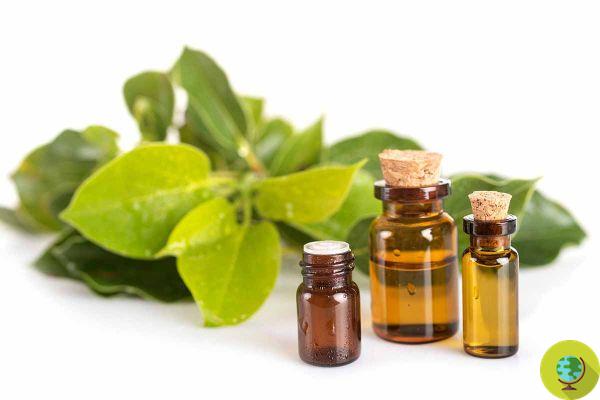
The properties and how to use ravintsara essential oil against colds and phlegm but also to combat muscle pain
Don't store avocado like this: it's dangerousEssential oils are precious natural allies that we should always keep at home. There are many variations but today we are talking about the Ravintsara, little known and often underestimated, especially if we think of its great potential against colds and phlegm.
Ravintsara essential oil is extracted from the distillation of the leaves of Cinnamomum camphora, a medium-sized tree of the Lauraceae family that is grown in Madagascar. In folk medicine it is used for its expectorant, antiseptic, antiviral and antibacterial properties, which are also confirmed by science.
Index
Ravintsara, properties and benefits
The properties of ravintsara essential oil are many but among the most interesting there is certainly the capacity expectorant, that is to dissolve excess phlegm and mucus that is deposited in the respiratory tract.
This oil also boasts antibacterial and antiviral properties, it especially helps with respiratory system problems, helping to treat a variety of ailments including colds, coughs, flu, bronchitis and more. But it can also be used in the preventive phase to avoid infections.
The antiviral properties were confirmed by some studies conducted in 2003 which showed the ability of the active ingredients of this oil to block viral replication. Other research has shown that the antiviral capacity joins that of strengthen the immune system with a strong anti-inflammatory and antioxidant action.
Ravintsara essential oil can also help treat a number of allergies. A 2016 study, combining essential oils of sandalwood, geranium and raventsara together, found that this blend helped relieve symptoms of allergic rhinitis, resulting in significant relief from nasal obstruction.
Another interesting property is the analgesic one, that is, ravintsara oil can offer relief from pain caused by joints or muscles but also help relieve the discomfort due to headaches or toothaches.
In practice, in summary, this essential oil can be useful mainly for:
- Relieve respiratory problems
- Reduce joint pain, toothache, muscle aches and headaches
- Prevent flu and colds
- Strengthen the immune system
How to use ravintsara essential oil
One of the best ways to use ravintsara essential oil, especially if we want to exploit its properties against colds and phlegm, is to spread it at home through the special diffusers. Remember that the dose is one drop of essential oil for every square meter of surface to be “flavored”.
In this way you will purify the air of the rooms in which you live (or sleep) and at the same time the refreshing aroma of this essential oil will help to clear the respiratory tract.
The alternative to diffusion is that of inhale the aromatic vapors adding 3-4 drops to a pan of hot water, inhaling until steam escapes.
Ravintsara oil can also be used in simple DIY recipes such as that of respiratory balm which is made with only 3 ingredients. Read also: DIY respiratory balm (very simple recipe)
Those who suffer from muscle or joint pain can experience its effectiveness by using it to make a "painkiller" bath. Just add 5-6 drops of ravintsara oil to a tub filled with warm-lukewarm water to which a few tablespoons of coarse salt or Epsom salts have been added. Soak for about 10-15 minutes.
Alternatively, you can dilute 3-4 drops of ravintsara in a carrier oil (for example sweet almond oil) and proceed to a massage on the painful areas.
A good combination to obtain greater results, especially in terms of antiviral and expectorant effect, is to use the essential oil of Ravintsara together with that of Eucalyptus radiata.
Effetti collaterali
Some people mistakenly believe that essential oils, since they are of natural origin, pose no health risk. In reality this is not the case at all. These are very concentrated products that must always be used with care and never on small children (with few exceptions). This is also true of ravintsara oil.
Generally this oil is quite safe and has no particular side effects, but it is a good idea to never exceed the doses (also for diffusion in the environments) and not to use it internally (unless it is under the supervision of an expert).
Also, if you want to experience the effect of respiratory balm, bath or massage, go for it always a little oil tolerance test first on a small area of the skin, to evaluate any allergic reactions before using it on larger parts.
To be avoided during pregnancy and if you suffer from asthma.
Follow us on Telegram | Instagram | Facebook | TikTok | Youtube
Read also:
- Eucalyptus essential oil: properties, benefits and a thousand daily uses
- Anti-cold essential oils: what they are and how to use them
- Antibacterial and antiviral essential oils: what they are and how to use them


























